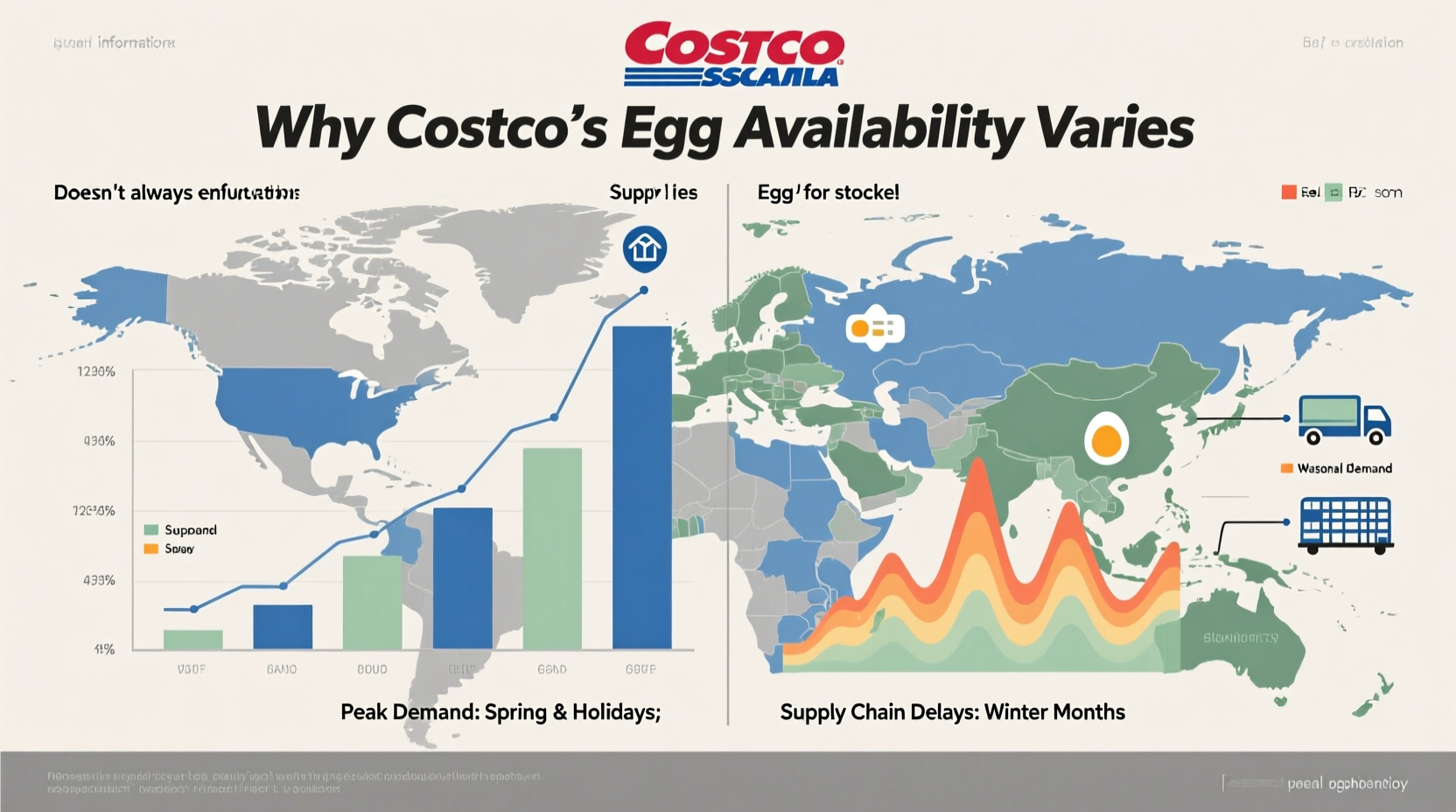Eggs are one of the most essential staples in American households, and for members of Costco, they’ve become something of a cultural icon—famous for their low price, bulk packaging, and frequent shortages. If you've ever walked into your local Costco only to find empty shelves where the 36-count egg cartons used to be, or seen a sign limiting purchases to “two per member,” you’re not alone. The inconsistency in egg availability at Costco isn’t random—it’s driven by a complex mix of supply chain realities, seasonal demand, food safety regulations, and strategic retail decisions. Understanding these factors reveals why even a retail giant like Costco can’t guarantee unlimited access to such a simple grocery item.
Supply Chain Challenges and Seasonal Fluctuations

The availability of eggs at any retailer, including Costco, hinges on a fragile agricultural supply chain. Egg production is highly sensitive to external conditions: extreme weather, disease outbreaks like avian influenza, feed costs, and labor shortages all impact output. In recent years, massive bird flu outbreaks have decimated poultry flocks across the U.S., reducing national egg supplies by as much as 40% during peak events.
Costco sources its eggs primarily from large-scale commercial farms under private label agreements. When those suppliers face disruptions, Costco’s inventory feels the ripple effect almost immediately. Unlike smaller retailers that might carry multiple brands and sources, Costco typically stocks just one or two varieties per category—often Kirkland Signature—making them more vulnerable to single-source interruptions.
Avian Influenza and Its Lasting Impact
In 2022 and 2023, highly pathogenic avian influenza (HPAI) spread rapidly among commercial and backyard flocks. According to the USDA, over 58 million birds were affected nationwide, leading to egg shortages and record-high prices. During these periods, Costco implemented strict purchase limits—not because of hoarding alone, but because actual supply was constrained. Even after farms recover, rebuilding flocks takes months; hens don’t start laying until about 18–20 weeks of age, so recovery lags behind demand.
Demand Spikes and Panic Buying Behavior
While supply issues set the stage, consumer behavior often amplifies scarcity. Events like holidays, pandemics, or even viral social media posts can trigger sudden surges in demand. For example, during Thanksgiving and Easter, egg usage increases significantly for baking and meal prep. Similarly, when inflation rose sharply in 2022–2023, many shoppers turned to warehouse clubs like Costco for value, increasing foot traffic and accelerating turnover of high-demand items like eggs.
Panic buying compounds the problem. A customer seeing limited stock may buy multiple cases “just in case,” which depletes inventory faster and signals to the store system that demand is even higher than it actually is—a phenomenon known as the “bullwhip effect” in supply chain management.
“Retailers like Costco operate on lean inventory models. When unexpected demand hits, even a few extra buyers per hour can wipe out daily allocations.” — Dr. Linda Chen, Supply Chain Analyst at MIT Center for Transportation & Logistics
Store-Level Allocation and Inventory Systems
Costco does not manage inventory uniformly across all 500+ U.S. warehouses. Instead, distribution is regional, based on warehouse size, historical sales data, and proximity to distribution centers. Smaller or newer locations may receive fewer pallets of eggs per delivery cycle compared to larger, busier clubs.
Each Costco receives shipments according to a predetermined allocation schedule. If a warehouse sells through its weekly egg shipment in three days due to high demand, it must wait until the next scheduled delivery—there’s no on-demand resupply option. This creates natural gaps in availability, especially in densely populated areas where competition for goods is fiercest.
Why Purchase Limits Are Rotating, Not Permanent
You may notice that some Costcos enforce egg limits while others don’t—even within the same city. This reflects real-time decision-making by store managers responding to local conditions. Limits are typically applied reactively: once a manager sees rapid depletion or signs of bulk purchasing, they’ll post a limit (e.g., “2 per member”) to extend product availability throughout the week.
These limits aren’t arbitrary—they help ensure fair access and prevent resale. Costco’s membership model emphasizes value for personal use, not commercial redistribution. By capping purchases, stores discourage individuals from buying dozens of cartons to sell online or at farmers markets.
Operational Policies and Vendor Contracts
Costco operates under strict vendor contracts that define volume commitments, pricing tiers, and delivery schedules. These agreements often include clauses that cap how much product a single warehouse can order per cycle, preventing one location from monopolizing supply at the expense of others.
Additionally, Costco prioritizes freshness and rotation. Eggs have a shelf life, and Costco aims to keep turnover high. Rather than overstocking and risking spoilage, warehouses prefer to maintain tight inventory control. This means they intentionally avoid carrying excess stock beyond projected demand—even if that leads to temporary sellouts.
| Factor | Impact on Egg Availability | Duration of Effect |
|---|---|---|
| Avian influenza outbreaks | Severe reduction in national supply | Months to over a year |
| Holiday demand (Easter, Thanksgiving) | Short-term spike in consumption | 1–3 weeks |
| Regional distribution delays | Local shortages despite national supply | Days to one week |
| Panic buying or resale activity | Accelerated sellout | Immediate, short-term |
| Store-specific allocation caps | Limits maximum stock per delivery | Ongoing, cyclical |
Real-World Example: The 2023 Holiday Shortage
In December 2023, several Costco locations in California reported complete egg sellouts for nearly 10 days. Local news outlets covered long lines and frustrated members. Investigation revealed a confluence of factors: a late-year surge in holiday baking, lingering supply constraints from earlier bird flu cases, and a regional trucking delay due to winter storms in Nevada affecting cross-country deliveries.
Store managers responded by implementing a two-carton limit and coordinating with regional distributors for emergency resupply. While larger warehouses received priority, smaller ones waited an extra four days. This case illustrates how localized issues can create widespread perception of scarcity—even when national supply is improving.
What Shoppers Can Do: Practical Strategies
While you can’t control the national egg supply, you can adapt your shopping habits to improve your chances of securing eggs at Costco.
Checklist: Maximizing Your Egg Purchasing Success
- Shop mid-week (Tuesday–Thursday) when restocking is complete
- Call your local warehouse or use the Costco app to verify egg availability
- Avoid weekends and holiday eves when demand peaks
- Follow your store’s social media page—some post inventory updates
- Consider alternative formats: liquid eggs or frozen options if available
- Respect purchase limits—they exist to ensure fairness
Frequently Asked Questions
Why does Costco limit eggs but not other groceries?
Eggs are uniquely prone to both supply volatility and high consumer demand. They’re perishable, subject to disease-related production drops, and heavily used in home cooking. Items like canned goods or dry pasta have longer shelf lives and more stable supply chains, making limits unnecessary.
Does Costco make less profit when they limit egg sales?
Not necessarily. While limiting sales might reduce short-term revenue, it helps maintain customer trust and prevents black-market resale. Long-term brand loyalty and consistent availability matter more to Costco than maximizing unit sales during scarcity.
Are organic or specialty eggs more likely to be limited?
Yes. Specialty eggs—such as organic, cage-free, or pasture-raised—often come from smaller supplier networks with tighter margins. These varieties are more susceptible to shortages and may be limited even when conventional eggs are available.
Conclusion: Navigating Scarcity with Smarter Habits
The inconsistent availability of eggs at Costco isn’t a flaw—it’s a reflection of real-world agricultural and logistical challenges. From avian flu to holiday baking rushes, numerous forces shape whether eggs are in stock and how many you can buy. Rather than viewing purchase limits as inconveniences, consider them part of a broader effort to distribute essential goods fairly in times of scarcity.
By understanding the reasons behind these fluctuations and adjusting your shopping strategy accordingly, you can stay ahead of shortages without contributing to panic cycles. The next time you see an “eggs limited to two per member” sign, remember: it’s not about restriction—it’s about sustainability, equity, and smart retail management in action.









 浙公网安备
33010002000092号
浙公网安备
33010002000092号 浙B2-20120091-4
浙B2-20120091-4
Comments
No comments yet. Why don't you start the discussion?